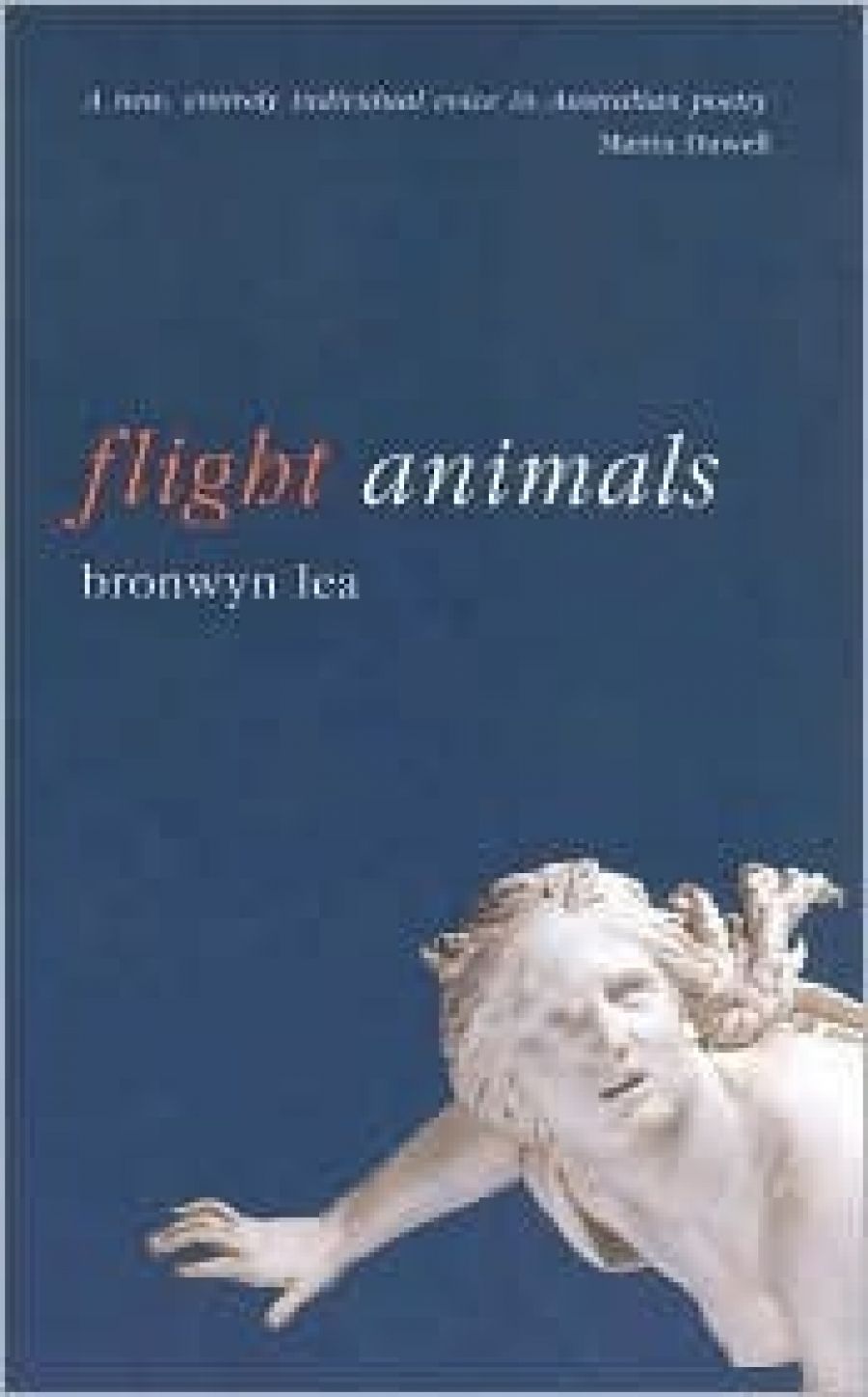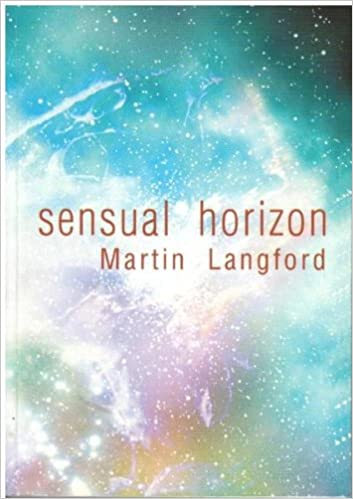
- Free Article: No
- Contents Category: Poetry
- Review Article: Yes
- Article Title: Four new poetry collections
- Online Only: No
- Custom Highlight Text:
Seamless with his two previous collections, Behind the Moon is Jacob Rosenberg’s potted autobiography of a survivor of Lodz and Auschwitz, delivered from that hell, of which he writes with the kindness of an angel, into the heaven that Melbourne must then logically be. To be the poet of reality and not self-delusion is his reality, is his commission. The trouble he contends with is that his present is posthumous, for the contemporary world could never be charged with such reality. Heaven doesn’t exist.
- Book 1 Title: Flight Animals
- Book 1 Biblio: UQP, 74 pp, $19.95pb
- Book 2 Title: Sensual Horizon
- Book 2 Biblio: Five Islands Press, 66 pp, $16.45pb
- Book 2 Cover Small (400 x 600):

Behind the Moon’s fifty-seven sonnets honour parents, sisters, friends, the family life of the ghetto, and the ghetto life during the Holocaust, the camp, liberation, emigration. I’ll take two as exemplary of this mode and tone. ‘Love’ is a sexual cameo that demolishes false piety whilst affirming humanity at its direst edge: ‘Quietly we walked behind the wired fence. / As my lips touched hers, her face began to sing. / Gently she led my hand beneath her dress, / her little breast like a joyous bud in spring.’ The power and significance of the erotic in this poem offers salvation as the effect of consciously suspended time. The gift of desire is to annihilate the pervasive threat of annihilation. So the tryst burgeons behind the wired fence, and a metaphor is elicited for any life sponsored by reason yet shackled by unreason. The final couplet is of course spoken by the woman but may also permit an ungendered plea: ‘Please come my love, into my deepest me, / And let me die a blossom on a cut-down tree.’
‘Father’ has its closing couplet bear out of that benign form the most fearful alarm. Certainly, it’s expected. As the raven is the ‘harbinger of death’, so the partially rhyming quatrains are harbingers of the poem’s dread manifested in the couplet. But, amplifying the entire book’s epigraph, ‘history forgets history; poetry remembers’, the poem’s new ‘day’ ensures the antithesis of its providential etymology. ‘Where the dusk outwits the dawn’, the horror hidden in daylight – men, that is, separated from wives and children, slaughtered – is revealed. Thus, ‘The day arrived without a smile. / Raven came, and tarried for a while.’ Simplicity, concision, so as not to offend the subject with anything remotely resembling ornament: Rosenberg’s poetry of the place and condition ‘where language died for very fear of words’.
Bev Roberts’s new book, My Sister and Silence, is political in the various ways our times prescribe. The cabaret of the ‘Star Spangled’ poems and ‘Politically lncorrect’s ‘Ms Bee’ poems (which return to the footlights that feisty persona from The Exorcism Trip of ten years ago) demonstrate both Roberts’s forte and fatal flaw.
The ‘Confession to the People of America’ almost plaintively attests: ‘We had questions to ask you, like / what simmers under cities / when steam spurts through sidewalks? // which way to turn in Oregon / at the signpost / offering a choice between / Boring and Damascus?’ I’m assuming that irony doesn’t exempt curiosity and hasn’t been waylaid by disingenuity. In ‘Imagining Myself as an American’ the satire is shrill. ‘My mouth would move differently / on the squarer shape of words / and my voice would be louder. / I’d be enthusiastic for sound / and patriotism can’t be mumbled ... / I would have neon-bright teeth, / long legs and size 9 feet. / Mostly I would taste sweetness, / I would probably be fat. / I would never be ignored in shops ... ’ I am afraid that Roberts’s objective here isn’t performance but pillory.
Whilst the poignant and humorous portraiture of the title sequence restores poetic credibility, it’s her broaching the deeper properties of light and dark in ‘The Cypress Battle’ that elevates the book. The fifth of the sequence of nineteen poems affords the kind of interplay of self and phenomena that poetry’s really made for. ‘As trees go the cypress is not cheerful, / it holds darkness in its wide arms / and sighs at the wind. / ... You can see it as the shape / and colour of your fears, / death in its giant darkness, / menace in its looming, / its eclipse of your light. // You’d tear it down / if you could.’ Tear it down and lose the opportunity to penetrate all the appearances we mistake for reality? For poetry’s sake, I hope not.
The title of Martin Langford’s fourth book, Sensual Horizon, properly describes the surface of his poetry, yet since his debut, he’s been an auditor of the contest in language of feeling and judgment. For all that, this collection contains superbly made and self-contained poems, for example ‘The Wish: Timar 7/9/99’, ‘Shakespeare, The Woman’, ‘The Currawongs’, its work flourishes as research. Reading ‘The Wish’, one doesn’t immediately realise that it’s the story of the near-fatal ballot for independence. Such artful avoidance of the obvious (no mention of voting or democracy, instead the infinitely evocative ‘how your wish was mistaken: I that thin bird of light / which had danced on the foreigner’s tongue / was just history, at play’) is the very carriage of Langford’s poetry. His experiment presses the reader to follow the contours of privileged words (like sky, child, light, pain, narrative) into their imagery and ideas. However his subscription to archetypes to explain personal and societal behaviour, and what I suspect is the postmodern pessimism about language’s ability to ground being, is less interesting to me than his image field (the sensual horizon?).
In different poems, sky ‘is so naked’; ‘was not a narrative itself; is a ‘bright sky, / with its vast accusations’; is ‘like the outermost / opaque-blue flare of the sun ... permanent inwardness / burning discretely like us’. As the dashes semicolons and triple-dots draw attention to the phrasing of Langford’s thought, so his unusual compound-nouns and adjectives, recalling Paul Célan’s unique practice, facilitates a poetry of lateral expansion. I could dwell forever in such a run as ‘the unready once-only / of time-heavy light’.
Bronwyn Lea’s first book, Flight Animals, could be subtitled ‘interlinear adventures’ given her visits to other poets and poems, notably her response to John Forbes’s 4 Heads & How to Use Them and to Fitzgerald’s eternal Omar Khayam. The rich range of reference, including an engagement with Buddhism, is presently a promise of the erudition she infers. It comprises one half of her ambition. ‘Seven Feet & Where They’re From’ doesn’t emulate the meta-poetic series the Forbes poem invites. Perhaps Lea takes her cue from Forbes’s conventional figure, ‘Nature in her wisdom’, to create a feminist heptad, depicting women in exotic tales of submission or liberation. Its seventh poem, ‘The Etymological Foot’, might just be cocking the snook at Forbes’s mock-heroic finale, declaring ‘One day I walked / a long time alone / and took tutelage in putting one foot / before another’.
Equally important to Lea’s poetry is sex, integrated in her narratives, disclosing character and story. It’s erotic rather than salaciously factual, since she creates sexual tableaux of entire situations. Like the opposites defining her world-view (‘the holding of / Europe and Australia in your blood.’, ‘Antipodes’), sex dynamises both happiness and sorrow.
Recalling a girlfriend’s ecstatic report of drugged lovemaking whilst watching lovers at a bus stop, the involuntary voyeur is literally wasted by the experience, their kiss ‘searing black holes onto my retinas / like a shadowgraph of lovers / burnt onto a city wall’. ‘Original Sin’, a valediction, embraces a friend in the frankest sexual recollection as she traces that life in a series of erotic episodes from young girl to older woman, ‘brushing the dry length / of her husband’s limbs as if with flour, / kneading his soft muscle, their tongues / mingling with embarrassment’.
The different halves of Lea’s project are bound by sequences of exquisite haiku, whose syllable-count so sweetly courts heart and mind.


Comments powered by CComment